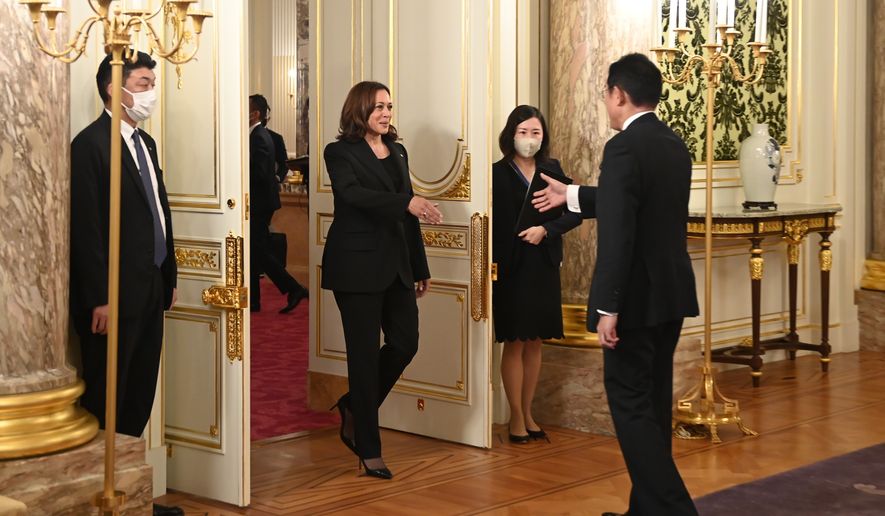Vice President Kamala Harris said U.S. security commitments to Japan remain “ironclad” after meeting with Japanese Prime Minister Fumio Kishida on Monday amid heightened tensions in the region.
The two leaders met behind closed doors after Ms. Harris touched down in Tokyo earlier Monday on her second visit to Asia as vice president.
“The alliance between Japan and the U.S. is a cornerstone of what we believe is integral to peace and prosperity in the Indo-Pacific region,” Ms. Harris said during a joint press conference following the meeting. “We also believe it is in the best interest of the American people.”
“On the issue of security, our commitments to Japan are ironclad,” she said.
Ms. Harris is leading a U.S. delegation to Japan to attend the funeral on Tuesday of slain former Prime Minister Shinzo Abe.
“I’m sorry it’s under these circumstances,” Ms. Harris said of the visit, adding that Mr. Abe’s leadership “strengthened the relationship between Japan and the U.S.”
SEE ALSO: Psaki says Dems ‘will lose’ if midterm voters focus on Biden
While in Japan, Ms. Harris is also slated to meet with Australian Prime Minister Anthony Albanese and South Korean Prime Minister Han Duck-soo. She will travel later in the week to South Korea, where she will meet with South Korean President Yoon Suk-yeol.
Senior administration officials said the purpose of the trip is to “reaffirm the United States’ commitment to our allies in an increasingly complex security environment” and to “deepen our overall engagement in the Indo-Pacific,” in addition to honoring the late prime minister.
The high-profile visit to the region amid increasing tensions in the Taiwan Strait adds to White House actions meant to bolster the vice president’s foreign policy chops, as speculation grows as to whether President Biden will seek reelection in 2024.
The U.S.-China ties have become increasingly strained after House Speaker Nancy Pelosi’s trip to Taipei in August.
The California Democrat became the highest-ranking U.S. official to visit Taiwan in decades, sparking a series of Chinese military exercises surrounding the island that is 100 miles off the mainland.
The White House has warned that China’s reaction to the high-profile stopover could cast a far-reaching shadow over U.S.-Chinese relations for the foreseeable future.
Relations became further inflamed after Mr. Biden said in an interview on CBS’ “60 minutes” that U.S. forces would defend Taiwan if China launches “an unprecedented attack” on the self-governed island.
Under the Biden administration, the U.S. has adhered to the so-called “One China” policy, under which Washington has long acknowledged Beijing’s position that Taiwan is part of China, even though the U.S. maintains informal diplomatic relations and substantial defense ties with the island democracy — and does not technically recognize Chinese sovereignty over it.
Shortly after the interview aired, the White House said the U.S. policy toward China had not changed.
“You can assume that Taiwan will come up in the various bilateral meetings, both in Japan and Korea,” the senior official said of the vice president’s trip. “Obviously, Japan and the Republic of Korea have a lot at stake in Taiwan and the region. This will be an opportunity for the vice president to discuss the recent developments and the way forward with the leaders of both Japan and the Republic of Korea.”
The U.S. also faces growing tensions with an increasingly bellicose North Korea that has significantly ramped up weapons testing under the Biden administration.
Officials say the vice president will “underscore the strength of the ROK alliance and discuss the threat posed by the DPRK” while meeting with Mr. Yoon.
• Joseph Clark can be reached at jclark@washingtontimes.com.




Please read our comment policy before commenting.